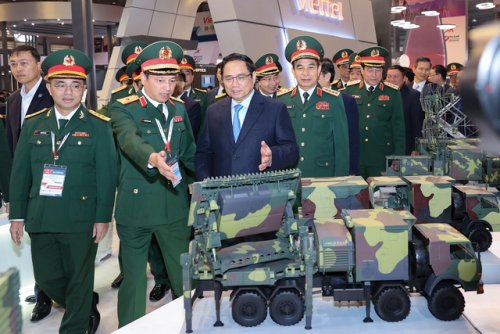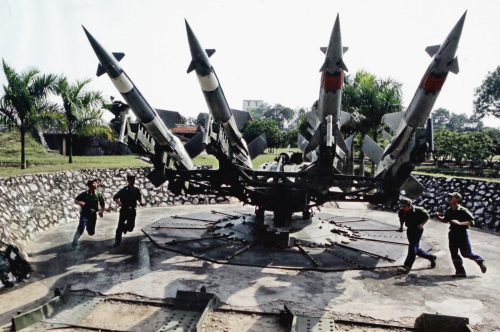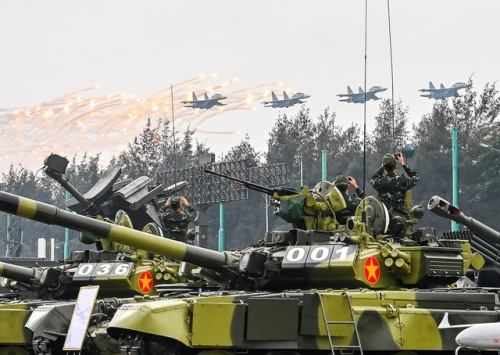The Party's viewpoint on the development of defence industry to meet the requirements of Homeland protection in the new period
III. Solutions for boosting the development of defence industry to meet the requirements of Homeland protection in the new period
From the achievements, situation and issues raised recently, in order to boost the development of the defence industry to meet the requirements of Homeland protection in the new period, it is necessary to synchronously implement a number of solutions, focusing on the following ones.
Firstly, strengthening propaganda and education to raise awareness and responsibility of Party committees, authorities at all levels, sectors, all cadres, Party members and people for this important task. Accordingly, the content of propaganda and education should be comprehensive. Together with a thorough propaganda of the Party and State's guidelines and policies on military, defence, and Homeland protection tasks, there is a need to focus on resolutions, projects, plans and schemes for building and developing defence industry in the new period, especially Resolution No. 08-NQ/TW, dated 26 January 2022 of the Politburo (13th tenure) on "Boosting the development of defence industry to 2030 and beyond", "Law on Defence Industry, Security and Industrial Mobilisation", etc. Doing this helps entities and forces, especially the presiding cadres at all levels, heads of core defence industry establishments, understand more fully and deeply the importance of the defence industry; the necessity, as well as the viewpoints, goals, tasks, and solutions to boost the development of the defence industry to 2030 and beyond; and the responsibilities of organisations and forces, etc. It is necessary to apply forms and measures flexibly, creatively, relevant to each subject; link propaganda and education with the fight against erroneous and hostile viewpoints and all misled perceptions, etc. On the basis of sound awareness, Party committees, ministries, branches, localities, agencies and units should strengthen leadership and direction; actively concretise the Party's viewpoints and policies into programmes, goals and plans and implement them in a resolute manner. Link the defence industry development programmes and projects with the socio-economic development plans, especially the industrial development plans of each locality, branch and the Military modernisation process. Timely make adjustments, supplements and effectively implement the plan for research, production, repair of weapons, equipment and dual-use items, etc. to meet the requirements of Homeland constructions and defence.
 |
| Prime Minister Pham Minh Chinh visits the Vietnam Internatioal Defence Expo 2022 (Photo: VGP) |
Secondly, continuing to perfect the system of laws, policies and mechanisms; consolidating the structure of the defence industry in the streamlined, compact and effective direction. In the context of international integration and the strong impacts of the Fourth Industrial Revolution, it is necessary to continue to review, proactively build and perfect the legal framework concerning the defence industry towards innovating and improving the effectiveness and efficiency of state management and administrative reform to ensure practicality, feasibility, and creating favourable conditions for the defence industry to integrate and develop rapidly and steadily. Promote the making and legalisation of specific mechanisms and policies for the development of the defence industry in order to mobilise, diversify and tap into resources for building a modern and dual-use defence industry. In particular, it is necessary to focus on elaborating specific mechanisms and policies on research and application of science and technology; implementing investment projects to manufacture key products; mobilise financial resources and draw the participation of economic sectors and large enterprise in the development of the defence industry; attract and develop high-skill human resources; encourage, promote and make good use of the talent; manage operations and enhance the leading role of core defence enterprises. Besides, continue to further streamline the structure of the defence industry, meeting the requirements of building a lean, compact and strong Army, advancing towards modernity. Restructure the core defence industry establishments in the way that reduce the number of weak enterprises, increase the scale and quality of a number of key ones towards forming an advanced and modern defence industry complex in line with the determination of Homeland protection and the strategic arrangement in the Northern, Central, and Southern regions. Continue to transform a number of research and design establishments into science and technology enterprises; establish a centre for defence industry innovation. Gradually develop military enterprises with technical and financial strengths to make them capable of researching, designing, manufacturing, and producing modern weapons and equipment, dual-use products with high economic value, meeting the requirements and tasks in the new period.
 |
| Troops of Air Defence Division 367 in operational readiness (Photo: VNA) |
Thirdthy, strengthening the training and development of high-skill human resources; attracting and making good use of the talent. In order to build a modern defence industry, there is a need to acquire necessary factors, in which, having high-quality human resources is a must. This is an objective necessity, the key issue that determines the development of the defence industry both in the short term and in the long run. Therefore, the Ministry of National Defence, directly the Defence Industry, should focus on training and developing high-quality human resources, especially military science and technology personnels in key and spearhead fields, such as: mechanical engineering, chemicals, new materials, special metallurgy, etc.; leading experts and chief engineers in the field of research, design, and manufacturing of strategic weapons, etc.; business administrators; skilled workers, etc. To improve the effectiveness of training, it is necessary to have close coordination between schools, research facilities, enterprises and management agencies in implementing training and fostering contents and programmes. Prioritise and expand foreign partners in training engineers to design and manufacture weapons and special equipment; skilled technicians; practical engineers who directly control and exploit modern technological equipment. There should be specific mechanisms and policies to attract the talent and potential brain power from socio-economic organisations, research and design establishments, and big domestic and foreign technology firms to participate in high-tech programmes and projects in the fields of artificial intelligence, telecommunications technology, information technology, core technology, etc., and some necessary fields rocket fuel and engines, fighter aircraft, submarines, drones, unmanned boats, surveillance radar, etc. Foster the formation of specialised research groups of regional and world levels in military science and technology, design and manufacture of modern weapons and equipment. Regimes and policies are to be reviewed, supplemented and perfected to improve living standards of cadres, workers, and labourers, especially leading experts, scientists, and talented engineers working in defence industrial establishments, so that they are satisfied and dedicated to their jobs, and contribute the most to the country.
 |
| Vietnam International Defence Expo 2022 attracted over 170 defence enterprises coming from 31 countries and territories (Photo: baochinhphu.vn) |
Fourthly, boosting the development of science and technology, making breakthroughs in research and development, production and repair of modern weapons and technical equipment. Importance is to be attached to promoting the implementation of in-depth technology investment projects for core defence industrial establishments. Resources are to be invested heavily in research to master core technologies in the design, manufacture and production of strategic weapons, automatic weapon complexes and new-generation precision weapons. At the same time, actively research and master core technologies for the production of smart weapons and equipment according to the model of command automated systems and master semiconductor microchip technology, circuit board design technology in the field of electronics and telecommunications, etc. In addition, cooperation is to be promoted to mobilise scientific and technological establishments, and civilian industrial establishments to participate in research, construction and development of the defence industry and dual-use industry. To make a breakthrough in research, development, and production of new-generation weapons and technical equipment, the defence industry should promote innovation, improve the capacity to design, and manufacture weapons and equipment, especially new-generation strategic weapons and army weapons. In the short run, investments should be made in the production of modern and strategic weapons, equipment, and military hardware in 5 main product groups, namely: weapons and equipment for the army; military ships and underwater weapons; missiles and military aerospace; military equipment; technical supplies. Increase the localisation rate of defence industry products; develop key areas, such as: mechanical engineering, special metallurgy, new materials, electronics and telecommunications, etc. based on new and modern technology, creating strong international competitiveness, and deeply participating in the global value chain.
Finally, strengthening international cooperation in defence industry. This is an important solution to "take shortcuts", acquire management experience, receive technology transfer, develop human resources, mobilise capital to develop a modern, dual-use defence industry, etc. Accordingly, the Defence Industry in general and defence industry establishments in particular should promote and diversify the content and forms of cooperation, focusing on both scientific research and technology transfer; production and repair of weapons and equipment; human resource training; purchase and sale of weapons and raw materials for the industry; exchange of managerial and organisational experience, etc. Emphasis should be placed to both bilateral and multilateral cooperation; strengthen relations with traditional partners such as Russia, India, Japan, etc.; expand cooperation with strategic partners with potentials and strengths in science and technology to develop strategic weapons; establish joint ventures with foreign partners in the research and manufacture of details, semi-finished products, supporting industries, etc. to serve domestic and export needs. Increase the exchange of working delegations, attend and chair international seminars, fairs, exhibitions, etc., thereby promoting trade promotion, product promotion, technology selection, etc. Each defence enterprise should learn to master advanced technology and modern management methods; focus on branding, improving competitiveness, promoting production and export of strong products, participating deeply and widely in the global supply chain, contributing to the rapid and sustainable development of the defence industry, meeting the requirements of Homeland protection in the new period.
CAO THANH - PHAM CUONG - MINH DUC